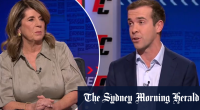Stay informed with free updates
Simply sign up to the UK inflation myFT Digest — delivered directly to your inbox.
UK shop price inflation fell below 2 per cent in March for the first time since the start of the cost of living crisis, in a sign that the surge in prices of the past two years is coming to an end.
Shop price annual inflation eased to 1.3 per cent in March, down from 2.5 per cent in February, according to data published on Tuesday by the British Retail Consortium. It is the lowest since December 2021, when it was 0.8 per cent, and the first reading below 2 per cent in more than two years.
The BRC, which produces the figures with the consumer insight company NielsenIQ, said that food and non-food prices both fell month on month by 0.3 per cent and 0.4 per cent, respectively.
The figures, which track data across all retailers, provide early indications of price pressures ahead of the official inflation data for March, published on April 17.

Research company Kantar last week released figures showing that grocery price inflation had dropped to its lowest rate in more than two years. The slowing price growth supports hopes that consumer spending will rebound this year, helping the economy to recover from last year’s recession.
The data was “good news for consumers”, said Helen Dickinson, chief executive of the BRC. She attributed part of the trend to retailers continuing “to compete fiercely to bring prices down for their customers”.
Dickinson added that Easter treats were more expensive than in previous years owing to high global cocoa and sugar prices, but “retailers provided cracking deals on popular chocolates, which led to price falls compared to the previous month”.
The BRC reported that dairy prices declined as farm costs eased, while the cost of electricals, clothing and footwear fell as retailers used promotions to entice consumers.
The data showed that food inflation continued to be higher than other categories at 3.7 per cent in March. However, this was down from 5 per cent in the previous month and was the lowest since April 2022. It was also well below its all-time high of 15.7 per cent reached in April 2023, when prices soared following Russia’s invasion of Ukraine.
Official data showed last month that easing food prices helped to reduce the official measure of inflation to 3.4 per cent in February from 4 per cent in the previous month.
Economists polled by Reuters forecast that UK inflation would drop below the Bank of England’s target of 2 per cent in both the second and third quarters of this year, prompting markets to expect the BoE to start cutting interest rates from the summer.
Non-food prices were broadly unchanged from March last year, with annual inflation of only 0.2 per cent in March. This is down from 1.3 per cent in February and the lowest since January 2022.
Also Read More: World News | Entertainment News | Celeb News









